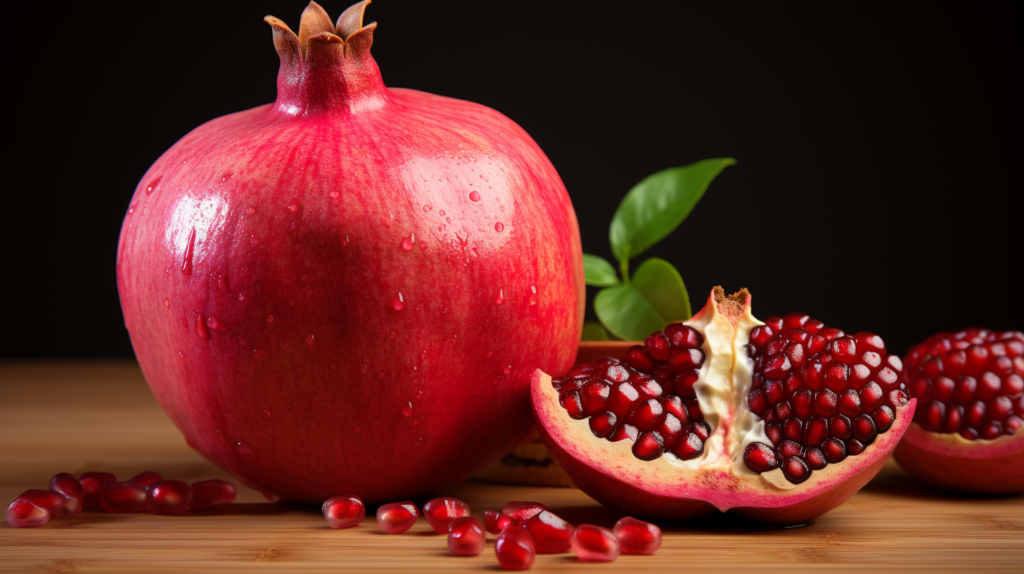If you’re looking for a delicious way to improve your heart health, look no further than the pomegranate. This vibrant fruit has been shown to naturally lower blood pressure and promote overall cardiovascular health.
With its potent antioxidant and anti-inflammatory properties, pomegranate can help protect your body against chronic diseases and support a stronger immune system. Plus, its high levels of vitamins and minerals make it a great addition to any healthy diet.
Key Takeaways:
- Pomegranate offers a wealth of health benefits, including improved heart health and lower blood pressure.
- The fruit is a rich source of antioxidants and anti-inflammatory compounds, which can help reduce the risk of chronic diseases.
- Incorporating pomegranate into your diet can be a delicious way to nourish your body and support overall well-being.

Understanding Pomegranate Nutrition Facts
Pomegranate is a highly nutritious fruit that is jam-packed with essential vitamins, minerals and antioxidants which are vital for a healthy diet. It is loaded with dietary fiber, folate, vitamins C and K, potassium, and flavonoids. In addition, pomegranate seeds also contain polyphenols, which give the fruit its deep red color and are potent sources of antioxidants.
| Nutrient | Amount per 100g |
|---|---|
| Calories | 83 |
| Water | 77% |
| Protein | 1.7g |
| Carbohydrates | 18.7g |
| Sugars | 13.7g |
| Fiber | 4g |
| Fat | 1.2g |
| Cholesterol | 0mg |
| Vitamin C | 10.2mg |
| Vitamin E | 0.6mg |
| Vitamin K | 16.4mcg |
| Potassium | 236mg |
| Calcium | 10mg |
| Iron | 0.3mg |
It is interesting to note that pomegranate seeds also contain punicalagins, which are unique antioxidants that are found only in pomegranates. These antioxidants have been shown to have potent anti-inflammatory effects and may help reduce the risk of chronic diseases like cancer, diabetes and heart disease.
Pomegranate is also an excellent source of flavonoids, which are powerful antioxidants that help protect the body against oxidative stress and inflammation. Studies show that consuming foods rich in flavonoids may help reduce the risk of several chronic diseases, including cardiovascular disease, hypertension, type 2 diabetes, and cancer.
Overall, incorporating pomegranate into your diet is a great way to boost your overall health and wellbeing. Whether you choose to enjoy the fruit on its own, add it to smoothies, or incorporate it into your favorite recipes, there are many ways to take advantage of its many health benefits.

Pomegranate’s Antioxidant Powerhouse
Pomegranates are known for their high antioxidant content, making them a powerful tool for maintaining overall health and preventing diseases. Antioxidants protect the body from free radicals, harmful molecules that can cause damage to cells and lead to various health issues.
One type of antioxidant found in pomegranate is polyphenols, which have been linked to a reduced risk of heart disease, cancer, and other chronic illnesses. In fact, some studies suggest that the antioxidant capacity of pomegranate is higher than that of other fruits, including blueberries and cranberries.
Additionally, pomegranate contains high levels of vitamin C, another powerful antioxidant that helps boost the immune system and protects against disease. Vitamin C also supports collagen production, which is essential for maintaining healthy skin, hair, and nails.
Incorporating pomegranate into your diet is a simple and effective way to increase your antioxidant intake and promote overall health. You can enjoy whole pomegranate seeds as a snack, add them to salads or smoothies, or even drink pomegranate juice.
Tip: When choosing pomegranate juice, be sure to select options without added sugars or preservatives to maximize the health benefits.

Pomegranate’s Anti-Inflammatory Properties
If you’re looking for a natural way to reduce inflammation in your body, consider adding pomegranate to your diet. Pomegranate contains powerful anti-inflammatory compounds, such as punicalagins and ellagic acid, that can help combat chronic inflammation.
Chronic inflammation has been linked to a range of health issues, including heart disease, diabetes, and arthritis. By consuming pomegranate regularly, you may be able to lower your risk of these diseases and improve your overall health.
Pomegranate’s anti-inflammatory properties may also benefit those with digestive issues, such as inflammatory bowel disease (IBD) or ulcerative colitis. Some studies have shown that consuming pomegranate extract can reduce inflammation and discomfort in those with these conditions.
Overall, adding pomegranate to your diet is a smart way to naturally combat inflammation and support your overall health.

Pomegranate’s Impact on Heart Health
One of the main benefits of incorporating pomegranate into your diet is its impact on heart health. Studies have shown that consuming pomegranate regularly can help lower blood pressure, reduce inflammation, and improve overall heart function.
The antioxidants found in pomegranate, such as punicalagin and ellagic acid, have been found to protect the heart against damage and promote healthy blood flow. They can help reduce arterial plaque buildup, which can lead to heart disease and stroke.
Pomegranate Juice vs. Whole Fruit
While both consuming pomegranate juice and eating the whole fruit can provide heart-healthy benefits, pomegranate juice may offer more concentrated levels of antioxidants. However, be aware that many store-bought pomegranate juices contain added sugars, which can be harmful to heart health.
It is recommended to consume whole pomegranate fruit or freshly squeezed juice without added sugars to reap the most significant heart-healthy benefits.

Pomegranate’s Potential in Cancer Prevention
If you’re concerned about reducing your risk of cancer, incorporating pomegranate into your diet may be a smart move. This fruit contains powerful antioxidants that can help protect your cells from damage and reduce inflammation in the body, both of which can contribute to cancer development.
There is evidence to suggest that pomegranate may be particularly effective in preventing prostate cancer. Some studies have found that consuming pomegranate juice or extract can slow the growth of prostate cancer cells and even lead to their death.
Other types of cancer that may be prevented or slowed by pomegranate include breast, lung, and colon cancer. Pomegranate’s anti-inflammatory properties may be especially beneficial for reducing the risk of colon cancer by decreasing inflammation in the gut.
The Science Behind Pomegranate’s Cancer-Fighting Capabilities
The cancer-fighting properties of pomegranate are due in large part to its high levels of antioxidants, which can neutralize harmful free radicals in the body. Free radicals are unstable molecules that can cause damage to cells and contribute to cancer development.
One specific antioxidant that is abundant in pomegranate is ellagic acid. This compound has been found to have potent anti-cancer effects in studies, particularly against prostate cancer cells.
Pomegranate also contains other compounds with anti-cancer potential, such as punicalagins and urolithins. These compounds have been shown to inhibit the growth of cancer cells and induce their death.
Incorporating Pomegranate into Your Diet for Cancer Prevention
If you’re looking to add more pomegranate to your diet for its cancer-fighting benefits, there are a few simple ways to do so. Pomegranate seeds can be eaten as a snack or added to salads, oatmeal, or yogurt. Pomegranate juice is widely available in grocery stores and can be enjoyed on its own or mixed with other juices.
Pomegranate extract supplements are also available, but it’s always best to get your nutrients from whole foods whenever possible.

Boosting the Immune System with Pomegranate
Your immune system plays a crucial role in protecting your body from harmful pathogens and infections. With the ongoing COVID-19 pandemic, having a strong immune system has become more important than ever. Luckily, incorporating pomegranate into your diet can help boost your immune system and keep you healthy.
Pomegranate is packed with antioxidants, including vitamin C, which is essential for immune function. In fact, one pomegranate contains about 40% of the recommended daily intake of vitamin C. Additionally, pomegranate contains other immune-boosting nutrients, such as vitamin E and vitamin K, which work together to support overall immune health.
In traditional medicine, pomegranate has been used for centuries to treat various infections and illnesses. Recent studies have also shown that pomegranate extract can enhance the activity of certain immune cells, including natural killer cells, which are responsible for defending the body against viruses and cancer cells.
It’s important to note that while incorporating pomegranate into your diet can help boost your immune system, it is not a substitute for other healthy habits such as getting enough sleep, exercising regularly, and washing your hands frequently. However, adding pomegranate to your diet can be a delicious and beneficial way to support your immune system.

Pomegranate for Weight Loss
If you’re looking to shed some extra pounds, pomegranate may be a helpful addition to your diet. While it’s not a magic weight loss cure, incorporating pomegranate into your meals can offer a range of benefits that can support your weight loss efforts.
Pomegranate is low in calories and high in fiber, which can help you feel fuller for longer, reducing cravings and aiding in portion control. Additionally, pomegranate contains compounds that can boost metabolism and increase fat burn.
Research has shown that pomegranate extract can help reduce body weight and body fat in overweight and obese individuals. In one study, participants who consumed pomegranate extract daily for 12 weeks experienced significant reductions in body weight, BMI, and waist circumference.
To get the most weight loss benefits from pomegranate, try incorporating it into your meals and snacks. Add pomegranate seeds to your yogurt or oatmeal in the morning, sprinkle them on top of a salad for lunch, or enjoy a glass of pomegranate juice as an afternoon pick-me-up.

Nourishing the Skin with Pomegranate
If you’re looking for a natural way to improve the health and appearance of your skin, pomegranate may be just what you need. Rich in antioxidants and vitamins, this fruit can help nourish and protect your skin from damage caused by free radicals and environmental stressors.
Pomegranate has anti-inflammatory properties that can help soothe and calm irritated skin, making it an excellent choice for those with sensitive skin. It’s also a natural source of ellagic acid, which has been shown to promote collagen production and improve skin elasticity, helping to reduce the appearance of fine lines and wrinkles.
But that’s not all – pomegranate also has moisturizing properties that can help hydrate and plump up your skin, leaving it feeling soft, smooth, and supple.
Pomegranate Skincare Products
There are a variety of skincare products available that incorporate pomegranate and its beneficial properties. Look for products such as cleansers, toners, moisturizers, and serums that contain pomegranate extract or oil to help nourish and protect your skin. You can also find pomegranate-infused masks and peels that can help exfoliate and brighten your skin for a healthy, radiant glow.
The Benefits of Pomegranate for Acne-Prone Skin
If you struggle with acne-prone skin, incorporating pomegranate into your skincare routine may be especially beneficial. Pomegranate is known for its antibacterial properties, which can help fight off the bacteria that cause acne. Its anti-inflammatory properties can also help reduce redness and inflammation, making it an excellent choice for those with acne-prone or sensitive skin.
Overall, incorporating pomegranate into your skincare routine may help improve the overall health and appearance of your skin, leaving it looking and feeling nourished, hydrated, and youthful.

The Power of Pomegranate Juice
Pomegranate juice has gained popularity in recent years for its potential health benefits. Made from the juice of the pomegranate fruit, this beverage is packed with vitamins, minerals, and antioxidants that may support overall health and well-being.
The Nutritional Value of Pomegranate Juice
One of the main appeals of pomegranate juice is its impressive nutritional profile. It contains high levels of vitamin C, which can help boost the immune system and promote healthy skin. Pomegranate juice also contains vitamin K, which is important for bone health, and folate, which is essential for cell growth and development.
In addition to vitamins, pomegranate juice is a good source of minerals such as potassium, which may help regulate blood pressure, and calcium, which is important for strong bones and teeth. Pomegranate juice also contains antioxidants, which we will explore further below.
The Antioxidant Properties of Pomegranate Juice
Pomegranate juice is rich in antioxidants, which are compounds that protect the body against damage from harmful molecules called free radicals. Free radicals can cause oxidative stress, which has been linked to a range of chronic diseases, including cancer, heart disease, and Alzheimer’s disease.
Some of the main antioxidants in pomegranate juice include punicalagins, which are believed to be responsible for much of its health benefits, and anthocyanins, which give the fruit its red color. Research has shown that consuming pomegranate juice may help reduce oxidative stress and inflammation in the body, potentially lowering the risk of chronic disease.
Pomegranate Juice and Heart Health
One of the most promising benefits of pomegranate juice is its potential to support heart health. Studies have shown that drinking pomegranate juice may help reduce cholesterol levels, lower blood pressure, and improve blood flow to the heart. These effects may be due to the high levels of antioxidants and polyphenols found in pomegranate juice.
A 2017 review of studies found that consuming pomegranate juice or supplements was associated with significant reductions in blood pressure, particularly systolic blood pressure, which is the top number in a blood pressure reading. The review also found that pomegranate juice may help improve cholesterol levels by reducing LDL cholesterol, which is often referred to as “bad” cholesterol.
How to Incorporate Pomegranate Juice into Your Diet
If you’re interested in trying pomegranate juice for its potential health benefits, look for 100% pure pomegranate juice without any added sugars or flavors. You can find pomegranate juice at most grocery stores, and it can be enjoyed on its own or mixed with other juices or sparkling water for a refreshing drink.
Keep in mind that pomegranate juice is high in natural sugars, so it’s best to consume it in moderation as part of a balanced diet. You can also enjoy the whole fruit itself, which contains similar nutrients and antioxidants.

Conclusion
Adding pomegranate to your diet can have a significant impact on your overall health and well-being. From its antioxidant and anti-inflammatory properties to its potential in preventing cancer and boosting the immune system, pomegranate is truly a superfood that should not be overlooked.
Incorporating pomegranate into your daily routine can be as simple as snacking on the seeds, drinking pomegranate juice, or adding the fruit to your favorite recipes. Whether you’re looking to lower your blood pressure, support heart health, or simply boost your overall health, pomegranate is a delicious and nutritious option.
Consult with your doctor if you have any concerns before adding pomegranate to your diet, especially if you are taking any medications or have a pre-existing medical condition.
Start enjoying the many health benefits of pomegranate today and experience the positive impact it can have on your body.
FAQ
Q: How can pomegranate naturally support heart health?
A: Pomegranate contains antioxidants that can help reduce inflammation and oxidative stress in the arteries, promoting better heart health. It also has the potential to lower cholesterol levels and reduce blood pressure.
Q: What are the potential benefits of pomegranate juice?
A: Pomegranate juice is rich in antioxidants, vitamins, and minerals, which can contribute to overall health and wellness. It may help improve cardiovascular health, boost the immune system, and support healthy skin.
Q: Can pomegranate help with weight loss?
A: While pomegranate alone is not a magical weight loss solution, it can be a nutritious addition to a balanced diet. Its high fiber content and low calorie count can help keep you feeling full and satisfied, potentially aiding in weight management.
Q: Is pomegranate beneficial for the skin?
A: Yes, pomegranate has several skin benefits. Its antioxidants can help protect the skin from damage caused by free radicals, promote collagen production, and moisturize the skin. It may also have anti-aging properties.
Q: How does pomegranate contribute to cancer prevention?
A: Pomegranate contains compounds that have shown potential in inhibiting the growth of cancer cells and reducing the risk of certain types of cancer, including breast and prostate cancer. However, more research is needed to fully understand its effectiveness.














